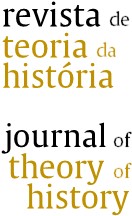Call for Papers 1-2021 • Filosofias da História | Philosophies of History
[CHAMADA ENCERRADA]
Faça download da chamada para artigos aqui | Download the call for papers here [PDF]
Faça download das instruções para submissão aqui | Download the guidelines for authors here [PDF]
Há ainda espaço para a filosofia da história, hoje? A crescente especialização da história-disciplina, somada às catástrofes ocorridas ao longo do século XX são dois fatores para a recusa, largamente estabelecida na academia, da categoria filosofia da história – muitas vezes reduzida às versões “clássicas” ou “substantivas” que, conforme o esquema proposto por Arthur Danto, procuravam determinar um sentido ou lógica total ao curso dos eventos históricos, tal como podemos ver em clássicos como Kant, Hegel ou Marx. Essa tendência foi reforçada pela ideia, primeiramente introduzida por William Henry Walsh, de que caberia ao historiador tratar apenas da questão epistemológica sobre como é possível conhecer a história, em detrimento de outras questões filosófico-teóricas a respeito da história. Se essa configuração disciplinar permitiu grandes avanços no que diz respeito ao debate epistemológico sobre a historiografia, ela também contribuiu para um relativo isolamento da disciplina frente a outras ordens do discurso historiográfico.
Nos últimos anos, porém, é possível verificar no campo da teoria da história uma reabertura para questões de caráter filosófico para além das questões estritamente ligadas à teoria do conhecimento. Em outras palavras, falar em “filosofia da história” não é algo que possa ser reduzido a uma dicotomia na qual, por um lado, estaria uma reflexão focada exclusivamente em fixar os critérios metodológicos da pesquisa e escrita da história, e, por outro lado, estaria uma abordagem “substantiva”, que procura identificar uma teleologia histórica determinista e universal. Muitos trabalhos recentes têm demonstrado que tal dicotomia não esgota as possibilidades para uma abordagem filosófica sobre a história. Inclui-se aí, por exemplo, as dimensões ético-políticas do discurso histórico, os pressupostos subjacentes às reivindicações por justiça histórica, a multiplicidade de tempos históricos, a emergência de novas sensibilidades histórico-temporais advindas com a revolução digital, entre outros.
Diante dessa atual tendência, apresentamos a proposta do Dossiê Temático “Filosofias da história”, com o intuito de reunir trabalhos que abordem as múltiplas possibilidades as quais o diálogo entre história e filosofia pode assumir, dentre as quais, listamos: história e temporalidades; sensibilidades históricas; história e justiça, história e existência, história e fenomenologia, conceitos históricos fundamentais, filosofias da historicidade, (ab)usos da história e da memória, história e ontologia, história e pensamento filosófico contemporâneo, história e hermenêutica, passado histórico e passado prático e narrativa histórica.
Data final para envio | 1 de março de 2021 Publicação em | julho de 2021
Submissões via website | https://www.revistas.ufg.br/teoria/about/submissions
Organizadores | Augusto B. de Carvalho Dias Leite | U F E S | Breno Mendes | U F G | Marcelo de Mello Rangel | U F O P | Walderez Simões Costa Ramalho | U F O P
***
Is there still room for Philosophy of History today? The increasing specialization of the discipline and the catastrophes that occurred throughout the 20th century are two factors for the widely established refusal of the Philosophy of History within academia. As a category of historical thought, Philosophy of History is often reduced to its “classic” or “substantive” versions which, according to the scheme proposed by Arthur Danto, sought to determine a universal meaning to the course of historical events, as one can see in Kant, Hegel or Marx. This tendency was reinforced by the idea, first introduced by William Henry Walsh, that it would be up to historians to deal only with the epistemological issues about how historiography is possible, thus leaving aside other philosophical questions on the historical phenomenon. This disciplinary configuration enabled great advances regarding the epistemological debate on historiography. However, it also contributed to the relative isolation of the discipline from other orders of historiographic discourses.
Recently, however, we notice in the field of Theory of History a reopening for philosophical approaches to history that goes beyond the discussions strictly related to theory of knowledge. In other words, Philosophy of History cannot be reduced to a dichotomy between a reflection that would be exclusively focused on fixing the epistemic criteria of historical writing and inquiry, on the one hand, and a “substantive” approach which seeks to identify a deterministic and universal historical teleology, on the other. Many recent works show that such dichotomy does not exhaust the possibilities for a philosophical approach to history. Among many other topics discussed in these works, one can find reflections on the ethical-political dimensions of historical discourse, the notions of time and history that underlie the claims for historical justice, the multiplicity of historical times, critical reassessments of historicization processes, and the emergence of new historical sensibilities arising from the digital revolution.
We present this Special Issue on Philosophies of History in order to bring together papers that address the multiple possibilities that the dialogue between history and philosophy can fulfill, including: history and temporalities; historical sensibilities; history and justice, history and existence, history and phenomenology, fundamental historical concepts, philosophies of historicity, (ab)uses of history and memory, history and ontology, history and contemporary philosophical thought, history and hermeneutics, practical uses of the past, and historical narrative.
Deadline | 1 March 2021 Publication | July 2021
Submissions via website | https://www.revistas.ufg.br/teoria/about/submissions
Guest Editors | Augusto B. de Carvalho Dias Leite | U F E S | Breno Mendes | U F G | Marcelo de Mello Rangel | U F O P | Walderez Simões Costa Ramalho | U F O P

